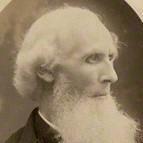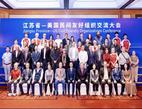John Shaw Burdon was an Anglican missionary in China. He stayed in China for more than 40 years and promoted the spread of the Gospel in south China.
Borten was born in Glasgow, Scotland in 1826. When he was young, he was moved by the Holy Spirit. In 1849, he entered the Missionary College of the Anglican Church to further his studies in preparation for overseas missions. In 1853, after graduating from theological school, he was immediately sent to preach in China. He came to Shanghai to serve, and in the following year he was appointed vicar (priest) by Bishop George Smith of the Victorian Diocese. Bolten served in Shanghai for nine years, during which he visited the Taiping Heavenly Kingdom. In 1857 he married Paulina Daya, sister of James Hudson Taylor's wife. But soon after, his new wife died of cholera.
In 1862 (or 1861), Bolten went to Beijing to serve. At that time the British Embassy had just been established in Beijing. In order to meet the spiritual needs of his compatriots, he set up a church in the British Embassy to provide a meeting place and a place of worship for British personnel in China. He served as the pastor of the Embassy for nearly ten years.
The failure of the two Opium Wars made the Qing Government realized the importance of learning from the West. Only in this way could it avoid being defeated by others and cultivate diplomatic talents who could better deal with Big Powers. Officials who actively took part in the Westernization Movement such as Prince Gong established the School of Combined Learning in Beijing. After living in China for many years, Burdon was proficient in both Chinese and English. Under the recommendation of the British Counsellor in China, William Wittmar, he was appointed as an English teacher and the first head teacher of the school.
According to the records, "The School of Combined Learning initially set up an English acadamy (equivalent to a department), and later added adacamies of French, Russian, German, Japanese, astronomy, mathematics, Ge Zhi (a general term for natural sciences such as sound, light, chemistry, electricity), chemistry and so on. The length of schooling is divided into two types( five years and eight years). The type of eight years is further divided into senior school, and junior school. Those who are excellent in junior school would be promoted to senior school. Students also studied astronomy, arithmetic, philosophy, chemistry, medicine, machine making, history and geography, and the law of nations.
As a general tutor, Bolten worked in the School of Combined Learning for many years and cultivated a group of outstanding and talented students who were excellent in general knowledge of Western science and culture. He occupies a central position in the history of modern Chinese education.
In 1874, He returned to England and was appointed bishop of South China at Lambergh. On December 13 of the same year, he became the third Bishop of Victoria at St. John's Cathedral in Hong Kong. He was also the headmaster of St Paul's College. Bolten pushed hard to spread the Gospel. In 1876, Bolten went on a mission to Fujian, where the Anglican Church was growing rapidly and the number of believers was the largest. In 1883, He established Zhenxue School in Fuzhou, and established Zhenxue Academy in the church in 1889 (Later, he established Fujian Union Theological College in cooperation with the Methodist Church), to train missionaries, which greatly promoted the missionary work in Fujian. He spread the seed of the Gospel all over South China. He sent missionaries to Jiangmen, Daliang, Heshan, Luoding, Enping, Xiangshan, Whampoa, Beihai, and other places in Guangdong and Guangxi to establish churches and bring people to the Lord. In addition, he traveled to Japan, leaving his missionary footprints in Tokyo, Nagasaki and Osaka.
In 1896, at the age of 70, he retired to England. In his later years, he travelled around Europe and engaged in writing, during which he returned to China many times. In 1907 he rested in the embrace of the God in Royston (or Shanghai), England, at the age of 81.
- Translated by Nicolas Cao












